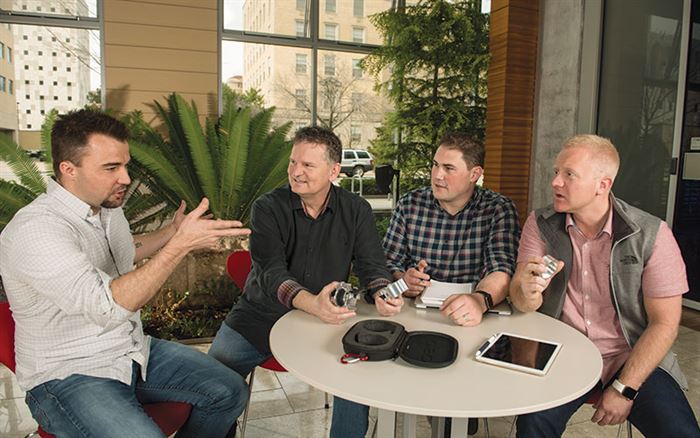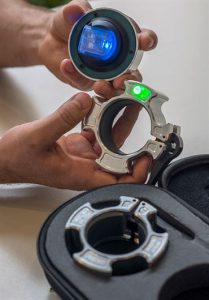WSB’s Business and Entrepreneurship Clinic guides entrepreneurs in the early stages
7.14.17 | School of Business News | Jane Burns | Original Publication

As an entrepreneur who had already launched two startups, Curt Frey (MBA ’13) wasn’t completely unfamiliar with bringing a product to the market. He had never worked the finance end of a deal, though, and found himself in new territory when he began to work on a unique fitness product.
Fortunately, Frey had somewhere to go to help guide him through the process: the Business and Entrepreneurship Clinic, a partnership between the WSB, the UW Law School, and the Wisconsin Alumni Research Foundation (WARF). The free clinic offers a broad range of services to help new entrepreneurs navigate business challenges.
“As an entrepreneur, there’s no roadmap and there’s no one guiding you,” says Frey, who needed help understanding finances and honing his pitch after serving in more creative and technical roles with earlier startups. “The clinic is a resource that provides an invaluable service.”
Since 2013 the clinic has helped approximately 140 clients seeking business advice for startups. The clinic offers assistance in a wide range of areas including sales and marketing, operations, finances, founders’ issues, competitive analysis, and more.
“We’ve had a really wide array of clients,” says Michael Williams (B.S. ’86), director of the Business and Entrepreneurship Clinic. “There was someone who was building birdhouses and wanted to know how to scale it up and there were six professors in crop science who were working on a project together.”
The clinic offers nearly 40 services in eight categories, easily enough to tackle any question an entrepreneur would have. The clinic’s mission is also educational, with much of the work done by MBA students putting into action what they learn in class. Clinic staff chooses clients based in part on the skills the MBA students have and the skills they need to hone.
“The topics I learn in class are topics I bring up with my clients,” says Ryan Ward (MBA ’17). “Whether it’s creating financial statements, laying out a pitch deck or honing a business plan, I get to apply what I’ve learned.”

Working to assist university researchers
The clinic began when WARF wanted to further assist researchers looking to commercialize a product or service. The Law and Entrepreneurship (L&E) Clinic, WARF’s collaboration with the UW Law School, was a great first step for many entrepreneurs, but they still needed more.
With legal questions answered, researchers or entrepreneurs then needed help with finances, pitches, employment issues, or business plans. A collaboration between WARF, the L&E Clinic and WSB resulted in the Business and Entrepreneurship Clinic.
“The first priority is WARF, if a client or researcher needs the help,” Williams says of the nonprofit technology transfer organization that serves UW–Madison. “But the client base is wider. We serve anyone who wants to develop a business in the state of Wisconsin.”
The clinic accepts clients at a monthly session called “intake,” where about a dozen entrepreneurs answer questions about their startup and discuss the assistance they need. Representatives of both the Law and Entrepreneurship and Business and Entrepreneurship clinics attend and decide which clinic best fits the client’s need.
“We see a lot of applications from people who are interested in starting their own craft brewpub or have a new app,” Williams says. “But every once in a while we get one where we just say, ‘Wow. I never thought of that before.’ And that’s pretty cool.”
One-on-one advice for clients
The two MBA students working at the clinic bring unique skills to their work. Matt Louison (MBA ’18, JD ’17) has a background in finance and sales. Ward has a background in digital marketing for small to mid-size businesses and B2B software companies with a goal of moving into technology entrepreneurship.
Frey met with Williams, Louison, and Ward several times in 2016 and 2017. He had developed his product, which attaches to a barbell so Olympic lifters can track the bar path, power, and efficiency of their workouts, and now needed to get it to the market. Frey worked with the clinic to improve on his biggest challenge—pitching to investors.
“My pitch deck was awful,” Frey says. “And investors had so many difficult questions that I didn’t have the answers to.”
Clinic staff assigned Frey a list of things to do. As he took their advice about which points to best get across and how to answer tough questions, his pitch improved. Since then, Frey has returned to the clinic with one-time specific questions such as financial language on a potential partnership agreement.
“I made an appointment, walked in, and said, ‘Does this make sense to you?’” Frey says. “Ultimately they kept me from completing a deal that wouldn’t have been valuable for my business.”
A nonprofit success story
One of the first startups helped by the Business and Entrepreneurship Clinic was a nonprofit. Two UW Hospital physicians, Dr. Mary Landry (M.D. ’92) and Dr. Katherine O’Rourke, approached the clinic for assistance in creating a budget for a free gynecological clinic they were founding in Madison for uninsured women. Thanks in part to the guidance they received, Share the Health opened in 2014.
Though the health clinic was an all-volunteer effort, the physicians knew there would be costs such as lab work and technology. The Business and Entrepreneurship Clinic helped point out further costs the physicians hadn’t considered.
“They got us thinking from a business perspective even though we are a nonprofit,” Landry says. “There are bills to pay, there’s postage, printing, liability insurance, promotion, a website. You can put a financial value on those things and create a plan for it.”
Frey appreciates the guidance he has gotten from the Business and Entrepreneurship Clinic, and says its accessibility shows how much the entrepreneurial community at WSB and UW–Madison are willing to help.
“You can’t even put a dollar value on what the clinic has helped me with,” Frey says. “I wish even more people knew about it.”